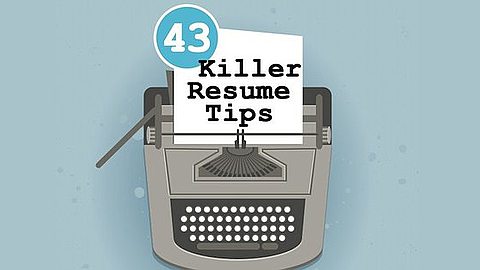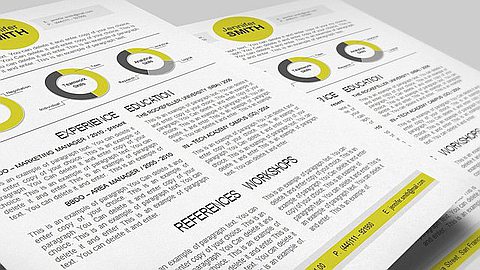The 5 Biggest Resume Debates Among Recruiters—Finally Answered

We know it’s confusing, so we’ve broken down the five most common resume debates. Here’s what the experts have to say—and how you can read between the lines and send the best resume for the job.
Debate #1: The Multi-page Resume
Let’s start with one of the most hotly debated issues we’ve seen at The Daily Muse. While one camp believes that a candidate’s story can definitely be told in the confines of one page (and gets annoyed when it isn’t), other recruiters say that a second (or third) page is fair game, as long as you make every word and bullet point count. Some even truly despise the one-page rule. (“If I had the names and addresses of every so-called expert who keeps telling professionals that you must have a one-page resume at all costs, I’d egg or toilet paper their houses in the dark of night,” says our friend Jenny Foss, founder of recruiting firm JobJenny and author of The Ridiculously Awesome Resume Kit.)
What Should You Do?
Here’s the truth. What’s much more important than the length of your resume is that it tells a story to the hiring manager about why you’re the right fit for the position. This usually doesn’t mean listing everything you’ve ever done for every position; rather, you want to pick and choose the parts of your background that are most compelling, and make sure they don’t get lost in pages and pages of background information. (Fact: Recruiters spend an average of six seconds on most resumes.)
That said, if you’re applying for an upper-level management gig or a position that requires a wide breadth of skill sets, telling that story means you’ll want to opt for more detail rather than less. Translation: Probably more than one page.
In addition, it’s important to do your research and poll friends and colleagues about your industry norms. In the IT and tech worlds, for example, more than two pages is totally normal (and expected). On the other hand, I know a consulting firm that tells its hiring managers to throw away any resume that comes in over one page. Try to feel out what you’re getting into—so you can target your resume accordingly.
Debate #2: The “Creative” Resume
You’ve likely heard about applicants using videos, infographics, or other creative resume formats (origami, anyone?) these days. And with good reason! Thinking outside the bullet-pointed PDF can be an awesome way to stand out from the stack, especially when you’re applying to a startup or creative company or to a position that values design or interactive skills. “Doing extra credit like a video (even if it’s an unedited webcam clip) can go a long way in distinguishing yourself from other candidates,” says Steffi Wu, PR Lead at ZenPayroll.
That said, some hiring managers really still appreciate the good ol’ 8.5×11” piece of paper. If not done really well, a creative resume could go terribly wrong—I’ve seen (and tossed) more than one resume that used bad clip art, a rainbow of colors, or unfortunate photography and did far more harm to the job applicant than good. “If you act like a clown or do something ludicrous just to stand out, then it’s disingenuous and can put people off,” echoes Dr. Michael Woodward, an executive coach author of The YOU Plan: A 5-Step Guide to Taking Charge of Your Career in the New Economy.
What’s more, a recent study showed that “…visual elements reduced recruiters’ analytical capability and hampered decision-making” and kept them from “locating the most relevant information, like skills and experience.” Not exactly what you’re going for.
What Should You Do?
When you’re in a creative field, applying for a creative role, or gunning for a highly competitive company, it’s definitely worth considering. Margot Leong got her dream job after sending an incredible Sliderocket presentation to startup Ridejoy—and we’re pretty sure that Robby Leonardi, creator of the coolest video-game-inspired resume we’ve ever seen, landed a job offer or 50.
Remember, though, at the end of the day, your skills and experience are what matters, so make sure that whatever format you choose showcases—rather than overshadows—them. Also, don’t even think about going down this path unless you’re willing to put in the time, creativity, and design work (or the money to pay someone else) to make it truly awe-inspiring. A great traditional resume will be better than a mediocre creative one, every single time.
Debate #3: The “Pretty” Resume
Common resume wisdom says to stick to a legible font that everyone uses, like Times New Roman or Arial, and basic formatting: Your name at the top of the page, followed by your work experience and bullet points—you know the drill.
But some of the most compelling resumes I’ve seen think outside the norm—and as a result, really do stand out in a huge stack of basic black-and-white resumes (take a look at some of these beauties). Stepping it up in the design department can also make you stand out as a candidate who really gets and appreciates aesthetics.
What Should You Do?
First, consider where you’re applying. A traditional law firm? You should probably stick to the basics. A creative (and competitive) place like Pinterest or Warby Parker, on the other hand, might really appreciate something a little more styled.
Then, think about your own skills as well. As Ryan Kahn, founder of the Hired Group and star of MTV’s HIRED, says, you should always seek to “maximize your strengths and outsource your weaknesses.” If you’re not a designer, spend your energy on crafting perfect bullet points, and skip the fancy formatting (or hire a designer or design-savvy friend to give your page a makeover).
And again, make sure you do it right. Use fonts that are clean and legible—doesn’t matter how pretty it is if a hiring manager’s going to have to squint to read it. Your resume should feel like a breath of fresh air, not a PITA to read. Oh, and PDF, PDF, PDF (that is, save it as one). It’s the only way to ensure that the font styling will show up the right way on any screen.
Debate #4: The Interests Section
You’ve probably heard—consistently—to stick to the basics on your resume: Work experience, education, job-related skills, and professional awards and accolades. “Unless the hobbies are relevant to the types of positions you’re pursuing (or amazing, non-controversial conversation starters), leave them off,” says Foss.
But “the non-traditional camp, of which I am a proud member, dissents in part,” says recruiting consultant Michael Wade. “Our view is that there is nothing wrong with an applicant disclosing some personal interests, so long as those inclusions are not bizarre or distasteful.” (True story: A friend of mine added “ice cream making” to his interests section, and it was brought up in every interview he went on.)
What Should You Do?
When it’s relevant for the position, go for it. Adding your guitar playing abilities to your resume when you’re applying to an entertainment company or your photography hobby to a social media role makes a lot of sense—and can nudge you above other candidates with similar work experience. Sharing your scrapbooking skills with a healthcare organization? Probably won’t have the same effect.
You might also want to get a little personal when you’re applying to a company that clearly cares about its employees’ lives outside of work. Some good cues: The company blog talks as much about picnics and happy hours as it does product updates, or it has a fun-loving team profiled on The Muse. “I’ve heard employers say they are tired of seeing cookie-cutter candidates. They are pleased when an applicant comes along who appears to be human,” adds Wade.
Debate #5: The “Updated” Job Title
“Usually, job applicants list their ‘official’ job titles on their resumes,” says Sean Weinberg on SimplyHired. Sounds pretty basic, right? Well, “the problem with doing this is that most job titles are bland, and your work comes off as equally uninteresting.”
Weinberg—and many other career experts—advocate updating your job title to reflect what you actually did. Say, for instance, your official title is associate producer. That could mean a whole range of things depending on your company, your industry, and your role. But adding some descriptors—“associate social media content producer,” for example, can tell a hiring manager a lot more about what you did—and catch his or her eye much more quickly.
What Should You Do?
If you have a vague or unique-to-your-company job title, this approach can be incredibly helpful. In a previous role, for example, my company didn’t use the word “manager,” so my title was “marketing lead”—a term that, as I learned, didn’t work very well in keyword-sensitive applicant tracking systems. When I edited my title and used “marketing manager” instead—I got many more calls back.
But here’s the rub: Remember that employers (very) often call previous employers to fact-check the information you’ve provided on your resume and in your application. So don’t ever update your title to something so obscure, inflated, or, well, wrong, that your former employers wouldn’t be comfortable saying you did it.
Advice on your resume, like anything else, isn’t going to be spot-on for 100% of people, 100% of the time. The bottom line? Do your research, then think about what will work best for you—and the positions to which you’re applying.





